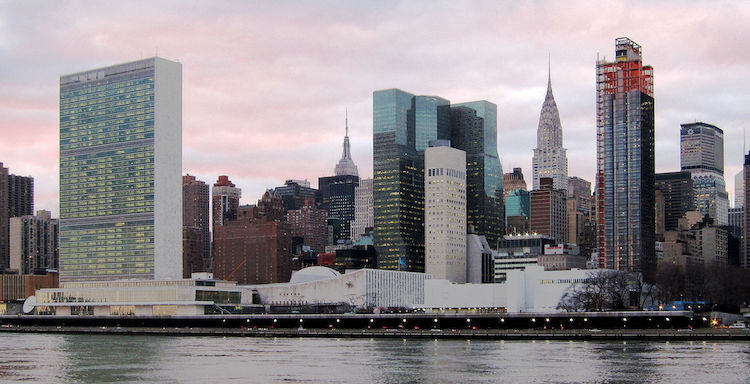By Ramesh Jaura
BERLIN | NEW YORK (IDN) – The Department of Political Affairs plays a central role in the United Nations efforts to prevent and resolve deadly conflicts around the world. But it will not be on the radar screen of the Security Council when it opens on July 21 the first round of unofficial ‘straw polls’ to agree on one of the 12 candidates for the post of the Secretary-General.
A candidate who is acceptable to the five permanent members – USA, Russia, China, Britain and France – and is elected later by the General Assembly to succeed Ban Ki-moon, whose second five-year term expires on December 31, 2016, will however have to pay heed to the Evaluation of the United Nations Department of Political Affairs (DPA). JAPANESE
The reason: DPA’s latest evaluation by the UN Office of Internal Oversight Services (OIOS) published on May 31, 2016 is studded not only with praise for the accomplishments of the Department. It also carries a few brickbats.
The Internal Oversight notes with satisfaction that since the 2006-2008 evaluation, DPA has evolved from a largely desk-based department into a more field-focused operation, reorienting its activities to support field-based conflict prevention and resolution (CPR) work.
CPR work is undertaken mainly through Special Political Missions (SPMs), which have increased in number since 2008, as well as through United Nations Country Teams in non-mission settings.
From Headquarters, DPA supports these various entities through liaison with Member States, other United Nations entities, and others to broadly foster an enabling environment for the field to succeed.
At field level, DPA support ranges from general assistance (for example, policy guidance, administrative assistance) to specialized expertise (such as electoral assistance, mediation), aimed at strengthening the field’s capacity to achieve its CPR mandates.
The latest evaluation assessed the relevance, effectiveness and efficiency of DPA substantive support to field-based CPR from 2008-2015. It relied on a wide a range of qualitative and quantitative sources to support its analysis.
During the period evaluated, DPA supported almost all of the highest-criticality conflict settings. The establishment of DPA regional offices, along with the deployment of Peace and Development Advisers to non-mission settings, has helped broaden its global reach, according to the OIOS evaluation.
“Beyond the highest-criticality settings, however, the Department’s presence is less far-reaching,” notes the Internal Oversight. It admits that resource constraints have limited its capacity to meet all needs. But adds that “strategic planning documents do not demonstrate clear, data-driven thinking on how DPA will focus its limited resources on other settings in need”.
DPA staff, the field-based entities they support, and OIOS direct observations underline that the Department’s shift away from desk-based analysis has left a gap – namely, early-warning analysis that could help DPA better foresee and act on potential threats to peace.
These gaps notwithstanding, adds the Internal Oversight, there is evidence that DPA support has been effective and that it has contributed positively to field success. Staff from entities in numerous field settings point to such examples.
“At the same time, they note areas of lesser effectiveness, namely the Department’s inability to address system-wide administrative challenges, coordination and intervention with other actors on behalf of the field, and long-term strategic guidance to the field,” says the OIOS Evaluation.
While the DPA’s attention to gender and human rights has progressed, “both Headquarters and field leadership remain gender-imbalanced, and neither gender nor human rights is universally a field priority”, criticises the Internal Oversight.
At the same time, while DPA has responded to the support needs of a growing number of field operations, its human and financial resources have not kept pace with demand.
“Wider United Nations administrative procedures have also hampered its efficiency. In addition, the Department is weakly positioned to monitor overall mission accountability for results, missions’ adherence to United Nations principles, and eventual exit. A lack of attention to harnessing knowledge on performance has further prevented the Department from enhancing accountability – and from learning from its successes and shortcomings,” states the Evaluation.
OIOS makes four important recommendations, all of which DPA has accepted. It asks the UN Department of Political Affairs to: institutionalize its role in strengthening field-level accountability, in consultation with the Executive Office of the Secretary-General.
DPA is also asked to fill key analytical gaps, i.e., in overall contextual analysis for early warning and early action, and in evaluation; strengthen Headquarters and field-level planning processes; and undertake measures to adequately resource core functional gaps.
In addition to its more than 250 professional and administrative staff at UN headquarters in New York, DPA draws from the work of political and peace-building missions under its supervision, which employ more than 1,700 national and international staff in Africa, Asia, Europe and the Middle East.
The Department works closely with Member States to establish UN regional offices capable of providing support and advice, as required, in conflict prevention and resolution. [IDN-InDepthNews – 15 July 2016]
IDN is flagship agency of the International Press Syndicate.
Photo: United Nations Headquarters in New York City, view from Roosevelt Island. Credit: Neptuul | Wikimedia Commons.




